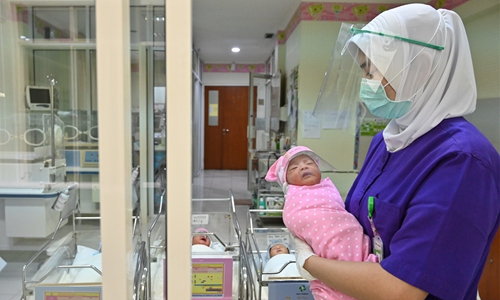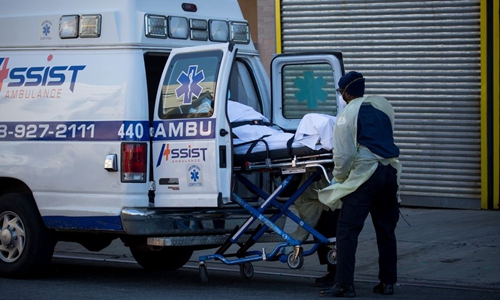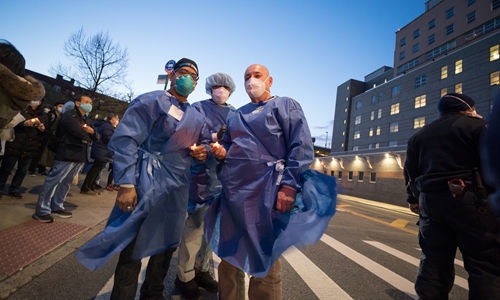COVID-19 tears world apart
By Chen Qingqing, Leng Shumei and Bai Yunyi Source:Global Times Published: 2020/4/21 23:48:40
Pandemic will affect global governance, spark instability

A nurse holds a newborn baby wearing a face shield amid the COVID-19 coronavirus pandemic, at a maternity facility in Jakarta on Tuesday. According to the latest WHO data, Indonesia has 6,760 confirmed cases. Photo: AFP
While the head of the World Health Organization (WHO) has warned that "the worst is yet ahead of us" in the coronavirus outbreak, some Western countries and regions are rushing into resuming normalcy by reopening businesses and restarting economy which has suffered a deep blow following city lockdown and social distancing measures.
With dim prospects for COVID-19 containment and fears of reviving the pandemic, local authorities, which relax on prevention and control measures, would highly likely bear severe consequences in facing more outbreaks. Two major ones: the public may have to coexist with the virus until the vaccines come out; the pandemic combat, instead of making people united, is driving the world apart, analysts warned.
The ongoing outbreaks, widely seen as an unprecedented threat to humankind, have been profoundly reshaping the world in a post-pandemic era, which would also have far-reaching implications at the social and geopolitical spheres. As more Western politicians and parties continue politicizing the public health crisis, they are driving the world apart, leading it to a dangerous situation.
Without national unity and global solidarity, the worst of the pandemic "is yet ahead of us," WHO Director-General Tedros Adhanom Ghebreyesus told a press briefing on Monday, warning that partisan politics and lack of global solidarity also helped fuel the pandemic.
He also mentioned that the virus exploits personal differences, especially those between ideologies or political parties, firing a major warning shot at impatience and incompetence within some governments that failed to get the virus under control, analysts warned.

Medical workers carry a patient into an ambulance in New York, the United States, April 6, 2020. Photo:Xinhua
Darkest moment
When the global coronavirus infection cases would soon reach 2.5 million with the overall death toll surpassing 171,000, as data from Johns Hopkins showed on Tuesday, some countries and regions, including the most virus-stricken ones such as Italy and the southern regions in the US, are moving ahead with plans for resuming business, which aroused questions about whether those places are really emerging from the darkest moment amid the outbreaks.. Or was it a rushed decision made as local officials are facing mounting pressure when thousands of people protest in demanding the regions to reopen?
"The infections will certainly continue to grow, but how worse the scenario can be depends on the anti-pandemic measure of each country," Zeng Guang, chief epidemiologist of the Chinese Center for Disease Control and Prevention, told the Global Times on Tuesday.
Some European countries and the US have not flattened the curve of new cases, while some developing countries are also facing more uncertainties as they are still at the early stages of the outbreak, which makes the pandemic hit the new peak "highly likely," he said.
With the highest infection numbers globally, the US is believed to have not flattened the curve of the pandemic while some experts suggested a gloomy forecast is inevitable, according to media reports. And a recent New York Times report said the virus has killed more than 1,800 Americans almost every day since April 7, and the official toll may be an undercount.
With or without taking into account advice from the WHO, Italy would join other nations in Europe, including Germany and Austria, in pushing forward a gradual return to normalcy. While Italy's lockdown continues until May 3, some businesses have reopened, according to a BBC report.
Wang Peiyu, deputy head of Peking University's School of Public Health, told the Global Times on Tuesday that, although the pandemic has shown a downward trend from the peak in general, sporadic cases will continue to pop up in at least the next one and half years.
Wang said the European countries' decision to ease lockdown restrictions must be made on a balance between epidemic control and the economy. As epidemic peaks in these countries have passed, their governments believe they can handle succeeding cases.
However, some observers expressed concern over a possible resurgence of the infection in some European countries, such as the UK and Germany, where people are still vulnerable to the disease. If that happens, it not only poses risks to the local economies but also the global recovery from this devastating public health crisis.
Jennifer Huang Bouey, senior policy researcher and Tang Chair in China Policy Studies at the RAND Corporation, told the Global Times the latest rebound in cases in Singapore - the country considered an example of containing the virus spread - helped people realize that except for a large number of people immunized through vaccines, any policy would only help contain the pandemic on a certain level. "It's hard for any country, any region to realize zero infection," she said.
"Rather than warning against a second wave or third wave risk, I'd rather say it's a long-term fight against COVID-19," she said, noting that most countries would adopt "tighten-loosen-tighten-loosen" alternative measures in the next two years, while the precondition for loosening measures is local authorities equipped with massive testing capabilities.
"Otherwise, there will be a large-scale of further spread," Huang said.

Elmhurst Hospital Center holds a vigil for colleagues and patients who have died during the pandemic on Thursday in New York. Photo: AFP
Post-coronavirus world
Observers said the impact of COVID-19 pandemic is like a war, which would cause more catastrophic damage and weigh on the foundation of global governance and stability, even leading to serious geopolitical instability.
Some countries' moves against the cooperative trend, including the US' intensive sanctions and disinvestment from the WHO, will do no good to pandemic controlling but possibly rather hurt the US' international prestige and influence, said Zeng from Chinese CDC.
In an apparent attempt to follow the steps of the US, some Western countries like France, Australia and Germany recently raised suspicions about China's handling of the outbreak, joining the Washington-led political battle against China and hurting the global cooperation and solidarity in fighting the common enemy.
"There is no worst but worse," said Mei Xinyu, a research fellow with the Chinese Academy of International Trade and Economic Cooperation under the Ministry of Commerce, warning that rushed relaxing may bring a second outbreak to Europe.
Before a COVID-19 vaccine can be massively used on people, which would take at least one year, the COVID-19 would have probably swept through wherever human lives for several rounds, the analyst forecast.
The current serious situation is partly due to the negative actions of some European and American countries at the early stage of the outbreak. Internal disorder in these countries also hindered their ability to organize and mobilize in the anti-epidemic campaign. "And global governance system and geopolitics are brewing a series of dramatic changes in the pandemic," he said.
Some countries like Argentina and France have begun seeing mounting social and economic pressure amid the pandemic when oil crash added disinflation and US debt surged to pass wartime record.
Mei also warned social turmoil in some gulf states, who heavily rely on oil exports, given the oil price collapse. This economic disaster has weakened these countries' wealth and thus their capacity to deal with the pandemic. So, in the long run, the economic crisis may turn into social and political unrest, even turmoil.
Posted in: DIPLOMACY